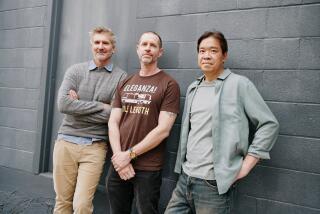Movie Review : ‘The Blue Kite’: An Honest, Powerful Chinese Saga
- Share via
Of all the remarkable films to have come out of China over the past few years, “The Blue Kite” could well be the most authentic, the most accessible and, finally, the most powerful. Daring politically and quietly shattering emotionally, it tells the truth in such a completely human way that it hardly seems foreign at all.
Unlike the work of fellow Fifth Generation filmmakers Chen Kiage (“Farewell My Concubine”) and Zhang Yimou (“Raise the Red Lantern”), there is nothing theatrical or operatic about this film from director Tian Zhuangzhuang. A welcoming naturalism characterizes his style here, an ability to see great events through the lives of ordinary people caught unawares in the toils of history that is immediately involving.
Set between the death of Stalin in 1953 and the living death of 1968’s Cultural Revolution, Xiao Mao’s realistic script illuminates that most chaotic period of modern Chinese politics by telling the story of an ordinary woman named Chen Shujuan (popular Chinese actress Lu Liping) and her extended family.
Simple as it is, this idea did not find favor with the powers who run China’s film industry. After viewing a rough cut of “The Blue Kite,” they forbade shipping the footage to Japan (where most Chinese films go for post-production). The film was spirited out anyway, edited according to the director’s detailed notes, and shown to great praise both at Cannes and the Tokyo Film Festival, where the Chinese delegation walked out during the screening and later announced plans to sue the Dutch company that had acquired the world rights.
It may seem unusual for such a quiet film to have stirred up such a considerable fuss, but it is just the discretion and restraint with which “The Blue Kite” was created that makes its points so effective and its indictment of China’s past political situation so damning.
Certainly when we first meet Shujuan, everything seems happy and hopeful. Much to the delight of her idealistic sister (Song Xiaoying) and her brothers (Zhong Ping and Chu Quanzhong), she is about to marry librarian Lin Shaolong (Pu Quanxin) and move into a small apartment in a bustling Beijing courtyard. Soon a son, called Tietou or “Iron Head,” is born and, true to his nickname, he grows up to be the film’s stubborn narrator.
Much of the action of “The Blue Kite” takes place in that busy courtyard and among the members of that family. Director Tian is a thoughtful, nuanced observer, and, helped by Hou Yong’s sensitive camerawork, he gets a great deal of poignancy out of intimate family scenes between brother and sister, mother and child, husband and wife.
These moments play out against the turmoil caused by the topsy-turvy political movements of the day. First came Rectification, a call from the Communist Party for honesty and criticism, followed almost immediately by an Anti-Rightist campaign that condemned those who did speak out. Next was the Great Leap Forward, a frantic attempt to increase China’s industrial production, which led finally to the mad terror of the Cultural Revolution.
“The Blue Kite” is especially good at showing how difficult it was for ordinary people to try to find space to just survive as the baffling crosswinds of politics caused the loss of jobs, relationships, even lives. “The more I think about it,” Shujuan says at one point, more in resignation than in anger, “the less I understand.”
This kind of rigorous, unforgiving look at a major span of Chinese history, a willingness to take on political movements that are still off-limits to criticism, is one of the things that got “The Blue Kite” in such trouble with the authorities. The other taboo, apparently never before addressed on film, is official insistence that attractive women in the army eschew steady boyfriends and instead provide escort services for powerful party leaders as “political duties.”
The only token of hope in this troubled time is the kite of the film’s title. A fragile paper object that keeps getting destroyed or lost and then rebuilt, it symbolizes freedom, beauty, innocence and the hope of escape, all the things that that generation of Chinese, as this film so carefully shows, had to live their lives without.
MPAA rating: Unrated. Times guidelines: It contains adult emotional situations.
‘The Blue Kite’
Yi Tian, Zhang Wenyao, Chen Xiaoman: Tietou
Lu Liping: Shujuan
Pu Quanxin: Shaolong
Li Xuejian: Uncle Li
Guo Baochang: Stepfather
Zhong Ping: Shusheng
Chu Quanzhong: Shuyan
A Fortissimo Film Sales, Longwick Film Production, Beijing Film Studio picture, released by Kino International. Director Tian Zhuangzhuang. Screenplay Xiao Mao. Cinematographer Hou Yong. Editor Qian Lengleng. Costumes Don Juying. Music Yoshihide Otomo. Art director Zhang Xiande. Running time: 2 hours, 18 minutes.
* In limited release, playing at the Music Hall, 9036 Wilshire Blvd., Beverly Hills. (310) 274-6869.
More to Read
Only good movies
Get the Indie Focus newsletter, Mark Olsen's weekly guide to the world of cinema.
You may occasionally receive promotional content from the Los Angeles Times.











